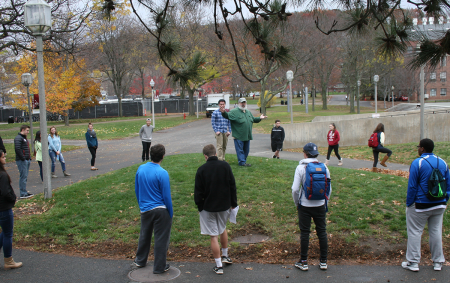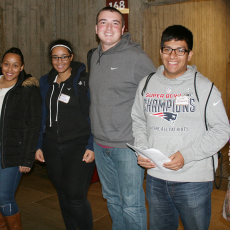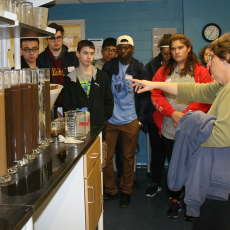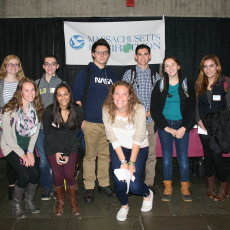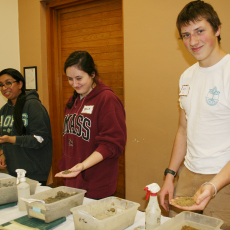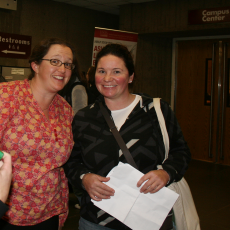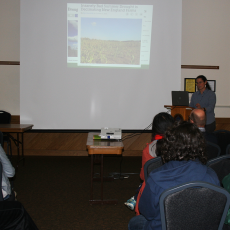On a warm morning in November, coaches and teams of students from 18 Massachusetts high schools arrived on the UMass Amherst campus to get started on this year’s “Envirothon.” The 210 students came from across the state to attend a full day of environmental workshops to prepare for the 2017 Massachusetts Envirothon competition. Students participating in the Envirothon process across North America focus on one current issue for the year; for 2017 the topic is agricultural soil and water conservation. Considering our severe drought this year--connected to the ability of soil to retain limited water-- this issue is certainly timely here in Massachusetts.
A quick primer on the Massachusetts Envirothon for the uninitiated: it is part of a larger North American Envirothon program whose mission is, “to develop knowledgeable skilled and dedicated citizens who have an understanding of natural resources and are willing and prepared to work towards achieving and maintaining a balance between the quality of life and the quality of the environment.” How does it happen? High schools choose to participate by forming teams of students who want to learn principles and practices of natural resource management, ecology, and complex resource management decisions. Coaches develop curricula, educational resources, and testing scenarios.
Field Trips Near and Far
Coaches explained their goals and approach to this year’s program. Michael Griffin, who has been coaching Bedford High School teams for over 20 years, shares a mantra with his students, “It is up to you to change the world.” He inspires them by teaching about environmental issues and accompanying his teaching with field trips. And not just your ordinary excursion to the local forest. His students have found rich educational opportunities in Belize and he is already planning an expedition to the Panama Canal in 2018. Griffin wants to show his students how research and cultural differences affect many environmental fields around the world.
Likewise, Helen Van Reil and Michelle Marro, teachers and coaches at Oliver Ames High School in Easton, are passionate about exposing their students to wider experiences. For the past three years their students have explored the Galapagos Islands off the coast of Ecuador. Students fund-raise all year for this experience.
At the other end of the state, Greenfield coach Cathy Wilkins has already climbed Mount Washington with her team and her students get literal hands-on experience as they dig into the soil in her garden. With the digging, her students began to make a clearer connection to the science of soil structure and resilience.
Coach Jennifer Ohop is a wildlife biologist who offers up her knowledge to the Monson High School team. She is not a teacher, but feels motivated to share her skills, hoping to give the next generation a boost in their understanding of environmental issues.
UMass role
Will Snyder of UMass Extension, Chair of the Massachusetts Envirothon Steering Committee, said that a major benefit of the UMass Envirothon workshops is that teams get an introduction to the many facets of the Current Issue topic from a variety of experts, including UMass faculty and staff. Snyder remarked, “This year it was particularly gratifying that we could offer a field trip to the Agricultural Learning Center field and to Simple Gifts Farm in North Amherst, as well as to our own Soil Laboratory, where teams could see soil and water issues in real life.”
During their time on campus, the high school students get to see their state university in action. They learn from actual lectures and presentations by UMass faculty. They interact informally with the UMass science majors that are recruited to welcome them in small groups at the beginning of the day. The dean of the University’s College of Natural Sciences hosts an informal reception for coaches first thing in the morning which offers the opportunity for these high school teachers to build relationships with UMass faculty and staff.
Timely topics
Workshop topics were wide-ranging and included: droughts and floods in Massachusetts; cover crops; soil and water conservation; tree identification; and freshwater wetlands among 17 other choices.
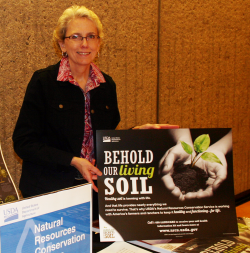 Diane Petit, Public Affairs Officer with the U.S. Department of Agriculture’s Natural Resources Conservation Service and Jeff Lafleur of the Mass. Association of Conservation Districts educated workshop attendees about the history of soil and water conservation in the United States. They impressed upon their audience the understanding that soil is a living, breathing ecosystem, not merely a growing medium: soil is teeming with nutrients and microbes. If we turn the clock back 80 years, we can connect the devastation of the midwest soils during the 1930’s, the “Dust Bowl” to the formation of the NRCS. When drought struck from 1934 to 1937, the soil in Oklahoma and Texas lacked the strong root system of grass as an anchor, so the winds easily picked up the loose topsoil and swirled it into dense dust clouds, called “black blizzards.” This circumstance was pivotal to understanding and protecting soil structure. Long-term effects resulted in farmers losing their livelihood and many farm families went hungry. The U.S. government response was to educate farmers about anti-erosion techniques including crop rotation and no-till methods of farming where soil develops better structure with an ability to hold water, keeping soil in place.
Diane Petit, Public Affairs Officer with the U.S. Department of Agriculture’s Natural Resources Conservation Service and Jeff Lafleur of the Mass. Association of Conservation Districts educated workshop attendees about the history of soil and water conservation in the United States. They impressed upon their audience the understanding that soil is a living, breathing ecosystem, not merely a growing medium: soil is teeming with nutrients and microbes. If we turn the clock back 80 years, we can connect the devastation of the midwest soils during the 1930’s, the “Dust Bowl” to the formation of the NRCS. When drought struck from 1934 to 1937, the soil in Oklahoma and Texas lacked the strong root system of grass as an anchor, so the winds easily picked up the loose topsoil and swirled it into dense dust clouds, called “black blizzards.” This circumstance was pivotal to understanding and protecting soil structure. Long-term effects resulted in farmers losing their livelihood and many farm families went hungry. The U.S. government response was to educate farmers about anti-erosion techniques including crop rotation and no-till methods of farming where soil develops better structure with an ability to hold water, keeping soil in place.
Christine Hatch, extension assistant professor of geosciences at UMass Amherst, lectured about how droughts and floods happen. She provided an overview of climate science and what the effects of climate change may have on water resources and agricultural practices. Students and coaches left the day-long workshop better prepared to grapple with their topic and found willing professors at UMass ready to act as resources when needed.
All teams will come together May 18 at the annual Massachusetts Envirothon competition (this time to be held at MassAudubon's Drumlin Farm in Lincoln) to demonstrate what they’ve learned about agricultural soil and water conservation as well as related environmental issues. The winner of this competition will go on to compete in the North American Envirothon at Mount St. Mary's University, Emmitsburg, Maryland, from July 23 - July 29, 2017.
Intrigued, but not yet signed up? Registration is open through mid-February, 2017. Anyone interested in forming a team should visit massenvirothon.org or contact Brita Dempsey, Coordinator at MassEnvirothon. As of November, 40 teams are registered.
